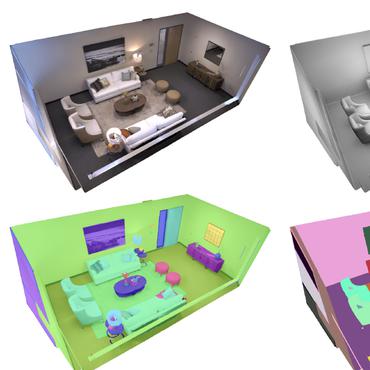Search Results for author: Yufeng Wang
Found 13 papers, 7 papers with code
An Iterative Associative Memory Model for Empathetic Response Generation
no code implementations • 28 Feb 2024 • Zhou Yang, Zhaochun Ren, Yufeng Wang, Chao Chen, Haizhou Sun, Xiaofei Zhu, Xiangwen Liao
Empathetic response generation is to comprehend the cognitive and emotional states in dialogue utterances and generate proper responses.
Exploiting Emotion-Semantic Correlations for Empathetic Response Generation
1 code implementation • 27 Feb 2024 • Zhou Yang, Zhaochun Ren, Yufeng Wang, Xiaofei Zhu, Zhihao Chen, Tiecheng Cai, Yunbing Wu, Yisong Su, Sibo Ju, Xiangwen Liao
Based on dynamic emotion-semantic vectors and dependency trees, we propose a dynamic correlation graph convolutional network to guide the model in learning context meanings in dialogue and generating empathetic responses.
DCIR: Dynamic Consistency Intrinsic Reward for Multi-Agent Reinforcement Learning
no code implementations • 10 Dec 2023 • Kunyang Lin, Yufeng Wang, Peihao Chen, Runhao Zeng, Siyuan Zhou, Mingkui Tan, Chuang Gan
In this paper, we propose a new approach that enables agents to learn whether their behaviors should be consistent with that of other agents by utilizing intrinsic rewards to learn the optimal policy for each agent.
 Multi-agent Reinforcement Learning
Multi-agent Reinforcement Learning
 reinforcement-learning
+2
reinforcement-learning
+2
Editing 3D Scenes via Text Prompts without Retraining
no code implementations • 10 Sep 2023 • Shuangkang Fang, Yufeng Wang, Yi Yang, Yi-Hsuan Tsai, Wenrui Ding, Shuchang Zhou, Ming-Hsuan Yang
To tackle these issues, we introduce a text-driven editing method, termed DN2N, which allows for the direct acquisition of a NeRF model with universal editing capabilities, eliminating the requirement for retraining.
PI-VEGAN: Physics Informed Variational Embedding Generative Adversarial Networks for Stochastic Differential Equations
no code implementations • 21 Jul 2023 • Ruisong Gao, Yufeng Wang, Min Yang, Chuanjun Chen
We present a new category of physics-informed neural networks called physics informed variational embedding generative adversarial network (PI-VEGAN), that effectively tackles the forward, inverse, and mixed problems of stochastic differential equations.
PVD-AL: Progressive Volume Distillation with Active Learning for Efficient Conversion Between Different NeRF Architectures
1 code implementation • 8 Apr 2023 • Shuangkang Fang, Yufeng Wang, Yi Yang, Weixin Xu, Heng Wang, Wenrui Ding, Shuchang Zhou
To address this limitation and maximize the potential of each architecture, we propose Progressive Volume Distillation with Active Learning (PVD-AL), a systematic distillation method that enables any-to-any conversions between different architectures.
One is All: Bridging the Gap Between Neural Radiance Fields Architectures with Progressive Volume Distillation
1 code implementation • 29 Nov 2022 • Shuangkang Fang, Weixin Xu, Heng Wang, Yi Yang, Yufeng Wang, Shuchang Zhou
In this paper, we propose Progressive Volume Distillation (PVD), a systematic distillation method that allows any-to-any conversions between different architectures, including MLP, sparse or low-rank tensors, hashtables and their compositions.
 Ranked #1 on
Novel View Synthesis
on NeRF
(Average PSNR metric)
Ranked #1 on
Novel View Synthesis
on NeRF
(Average PSNR metric)
Less Emphasis on Difficult Layer Regions: Curriculum Learning for Singularly Perturbed Convection-Diffusion-Reaction Problems
1 code implementation • 23 Oct 2022 • Yufeng Wang, Cong Xu, Min Yang, Jin Zhang
Although Physics-Informed Neural Networks (PINNs) have been successfully applied in a wide variety of science and engineering fields, they can fail to accurately predict the underlying solution in slightly challenging convection-diffusion-reaction problems.
Towards Accurate Binary Neural Networks via Modeling Contextual Dependencies
1 code implementation • 3 Sep 2022 • Xingrun Xing, Yangguang Li, Wei Li, Wenrui Ding, Yalong Jiang, Yufeng Wang, Jing Shao, Chunlei Liu, Xianglong Liu
Second, to improve the robustness of binary models with contextual dependencies, we compute the contextual dynamic embeddings to determine the binarization thresholds in general binary convolutional blocks.
Improve Deep Image Inpainting by Emphasizing the Complexity of Missing Regions
no code implementations • 13 Feb 2022 • Yufeng Wang, Dan Li, Cong Xu, Min Yang
Deep image inpainting research mainly focuses on constructing various neural network architectures or imposing novel optimization objectives.
Semi-supervised Multi-task Learning for Semantics and Depth
no code implementations • 14 Oct 2021 • Yufeng Wang, Yi-Hsuan Tsai, Wei-Chih Hung, Wenrui Ding, Shuo Liu, Ming-Hsuan Yang
Multi-Task Learning (MTL) aims to enhance the model generalization by sharing representations between related tasks for better performance.
Missingness Augmentation: A General Approach for Improving Generative Imputation Models
1 code implementation • 31 Jul 2021 • Yufeng Wang, Dan Li, Cong Xu, Min Yang
However, data augmentation, as a simple yet effective method, has not received enough attention in this area.
PC-GAIN: Pseudo-label Conditional Generative Adversarial Imputation Networks for Incomplete Data
1 code implementation • 16 Nov 2020 • Yufeng Wang, Dan Li, Xiang Li, Min Yang
Further, this classifier is incorporated into the generative adversarial framework to help the generator to yield higher quality imputation results.








